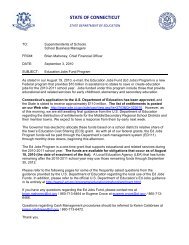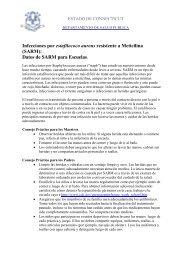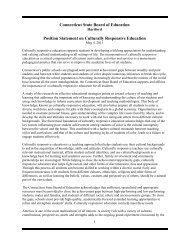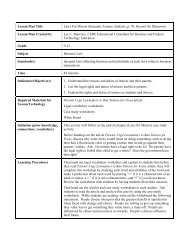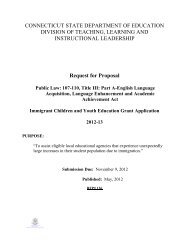Early Childhood - Connecticut State Department of Education
Early Childhood - Connecticut State Department of Education
Early Childhood - Connecticut State Department of Education
You also want an ePaper? Increase the reach of your titles
YUMPU automatically turns print PDFs into web optimized ePapers that Google loves.
Social-Emotional Competence and Family Relations Chapter 10<br />
must provide a variety <strong>of</strong> experiences in large and<br />
small groups that encourage children to exercise these<br />
social skills in supportive settings. Young children<br />
are developing a social understanding and becoming<br />
socially competent. Social skills include the ability to:<br />
• express wishes and preferences clearly;<br />
• assert own rights and needs appropriately;<br />
• express frustrations and anger effectively and<br />
without escalating disagreements or harming<br />
others;<br />
• gain access to ongoing groups at play and<br />
work;<br />
• take turns fairly easily;<br />
• show interest in others;<br />
Children today experience multiple images and experiences<br />
that are conflicting and overwhelming. Television,<br />
radio, magazines and other media bombard us<br />
with violent stories <strong>of</strong> aggression and disputes whether<br />
we are in our homes, in line at the supermarket or<br />
in our cars. Children are encouraged to “play nice,”<br />
yet simultaneously to stand up for themselves (Levin,<br />
1994). Little time exists for children to play in their<br />
neighborhoods, where many problem-solving abilities<br />
were learned in the past (Pirtle 1997). Children<br />
must be taught problem-solving skills in prepared and<br />
structured environments where positive and negative<br />
behaviors can be expressed in caring settings.<br />
Guiding children to express positive emotions involves<br />
the following skills:<br />
• Support children in discussing the problem.<br />
Guide children in answering questions such<br />
as: What toys are involved? What did you do?<br />
PROBLEM-SOLVING SKILLS<br />
133<br />
• exchange information with and request<br />
information from others appropriately; and<br />
• interact nonverbally with other children with<br />
smiles, waves, nods, etc. (McClellan & Katz,<br />
2001)<br />
These skills take time to develop and must be<br />
rehearsed by young children so they can become aware<br />
<strong>of</strong> the effects their actions have on others. Repeated<br />
experiences with positive outcomes, guidance from<br />
teachers and maturity all contribute to success in the<br />
social-emotional domain. One <strong>of</strong> the best practices in<br />
building children’s social-emotional skills is to encourage<br />
children’s play.<br />
What did the other child do? How are people feeling?<br />
What do you want to happen?<br />
• Encourage children to recognize the needs<br />
and feelings <strong>of</strong> all people involved in a dispute.<br />
• Model language that describes feelings and<br />
events until children can comfortably use<br />
appropriate language by themselves.<br />
• Brainstorm with children about possible solutions<br />
so everyone feels OK about the resolution.<br />
• Accept children’s ideas even if they don’t<br />
seem totally fair, especially if all are in<br />
agreement. The goal is for children to rely<br />
on their own abilities to negotiate and solve<br />
problems.<br />
• Allow children to try out their new problem-solving<br />
skills.





